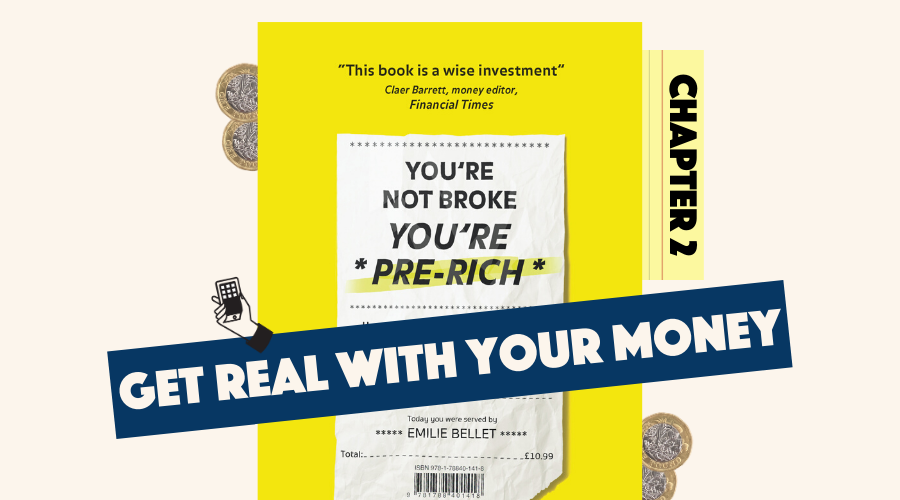Chapter 2 – Get Real With Your Money
These mini-money guides are based on the practical money book "You're Not Broke You're Pre-Rich" by Emilie Bellet.
So, you’ve mastered a new, more positive ‘money mindset’. But how do you know if you are on the right track to building your wealth?
I used to focus solely on my income as a measure of my wealth: if I was earning a lot, I must be rich and if I wasn’t then I must be poor. But how much you earn is only one parameter. I’ve learnt over time that it’s not about how much you earn or spend, but rather how much you save and grow.
The first task to getting a basic handle on your finances is to work out your ‘net worth’ – adding up everything you own and taking away everything you owe, to end up with one figure. It is an accurate snapshot of your finances today, not yesterday or tomorrow. The end result might come as a surprise to you – some people who are high earners have a very low net worth (perhaps because they have a big mortgage or credit card debt) and vice versa. Try calculating your own via the table below.
And if your net worth is negative, don’t panic – this is simply a way to get on the right track and start making those small changes, like contributing to your pension, or cutting out some unnecessary costs. Building wealth requires patience, as your number won’t grow overnight – but it’s truly rewarding and empowering once you start to see it start to increase.
There are more questions here, for example, how often should you check your net worth? And how can you start to build your wealth? We will answer all these and more.
Another important number is your ‘credit score’ – an indicator of your financial history, which is important for things like getting a mortgage or a phone contract. You can check yours for free with most of the big providers, like Equifax and Experian, and check it as often as you like. The higher your score, the better, generally speaking. There are no quick fixes to improving your score, but some tips include keeping your details up to date, only sharing financial products with people who have a good credit history, and paying off debt as quickly as you can.
Debt comes in many forms and is a big challenge for many of us. More than six million people in Britain believe that they will never be debt-free, according to a research by the Royal Society for Public Health. But remember, there is good and bad debt. Good debt includes mortgages and student loans – money you borrow for assets which increase in value over time and which usually have a lower interest rate. Bad debt is money you borrow for things that lose value over time, and usually have a higher interest rate. Good debts are the ones that shouldn’t keep you up at night. We also take a look at overdrafts, student loans, store cards, mortgages, secured versus unsecured debt, as well as how to avoid scams.
If you take away any lessons, these are the most important one: Don’t just make the minimum repayments on your credit card because it is expensive and may take a long time to pay back. Second, avoid unnecessary fees like using your credit card to withdraw cash. And third, don’t touch payday loans with a barge pole.
We know these exercises can be hard. Managing and facing debt comes with a big emotional cost. Make a commitment to not take any more debt, face the numbers, and get help if you need it, as soon as you need it, for example from a financial adviser, the Citizens’ Advice Bureau or the Money Advice Service. You don’t have to do this alone, and over time you will get to a much better place, where you are in control.
JOIN THE COMMUNITY!
Get our weekly newsletter and check our future events here.
If you want to learn more about the book and see a few photos from the book tour, it’s here. You can order "You're Not Broke, You're Pre-Rich" on Amazon and if you’ve read the book and enjoyed it, I will be forever grateful if you could review it on Amazon or Goodreads.
DISCOVER MORE CONTENT FROM THE BOOK
Chapter 2 – Get Real With Your Money
Chapter 3 – Planning For The Future
Chapter 4 – Own It: Get A Grip On Your Money
Chapter 5 – Asking For More £££
Chapter 6 – Navigating Your Bank Balance
Chapter 7 – How Does Investing Work?
Chapter 8 – Investing in The ‘Stock Market’
Chapter 9 – Want to Buy a House?
Thank you, Emilie


